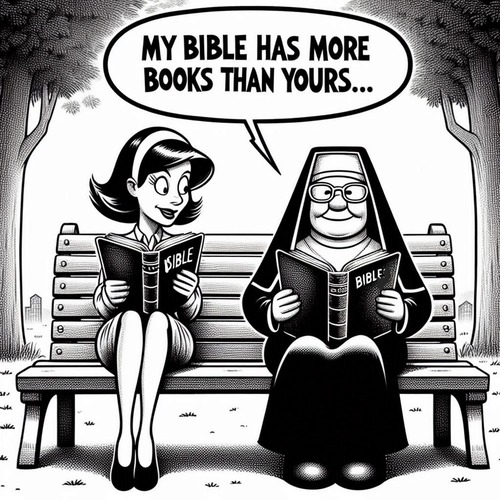The Truth About Apocryphal Books: Why They’re Not in the Bible
In the realm of biblical studies, few topics generate as much discussion as the Apocryphal books and their exclusion from the Protestant Bible. These ancient texts, while historically significant, have been a topic of debate among scholars and believers alike. Let’s delve into the reasons why these books are not considered part of the biblical canon and what that means for our understanding of Scripture.
What Are the Apocryphal Books?
The Apocrypha refers to a set of books written in the intertestamental period—the time between the Old and New Testaments. These texts include historical accounts, wisdom literature, and additions to canonical books. While some Christian traditions include these in their Bibles, many don’t consider them divinely inspired Scripture.
Historical Context: The Formation of the Biblical Canon
To understand the exclusion of the Apocrypha, we must first look at how the biblical canon was formed. The Old Testament canon was largely settled by the time of Jesus, while the New Testament canon developed in the early centuries of the Church. During this process, the early believers carefully discerned which books were truly God-breathed and authoritative.
Reasons for Excluding the Apocryphal Books
- Lack of Divine Inspiration: One of the primary reasons for excluding the Apocrypha is the absence of clear divine inspiration. Unlike the canonical books, these texts do not claim divine authority with phrases like “Thus says the Lord.” They lack the prophetic and spiritual power characteristic of divinely inspired writings.
- Not Recognised by Jesus or New Testament Authors: Significantly, neither Jesus nor the New Testament authors ever quoted from or alluded to the Apocryphal books as Scripture. This is in stark contrast to their frequent citations of Old Testament books, which they clearly regarded as authoritative.
- Rejected by Early Church Fathers and Councils: Many influential early Christian leaders and important church councils did not accept the Apocrypha as canonical. This consensus among the early church played a crucial role in defining the boundaries of Scripture.
- Historical and Doctrinal Inaccuracies: Several Apocryphal books contain historical errors and doctrinal teachings that are inconsistent with the accepted Scriptures. This lack of harmony with established biblical truths raised serious questions about their divine origin.
The Protestant Reformation and the Apocrypha
The Protestant Reformation brought renewed focus on the canon of Scripture. Reformers emphasised the principle of Sola Scriptura (Scripture alone), which led to a careful examination of which books truly constituted God’s Word. They maintained a clear distinction between helpful religious literature and divinely inspired Scripture.
Common Misconceptions About the Apocrypha
- “The Early Church Used These Books”: While it’s true that some early Christians read and valued the Apocrypha, this doesn’t equate to considering them Scripture. Many writings were used for edification without being seen as divinely inspired.
- “They Were in the Septuagint, So They Must Be Scripture”: The presence of these books in the Septuagint (the Greek translation of the Old Testament) doesn’t automatically grant them canonical status. The Septuagint also contained other non-canonical works.
- “Removing These Books Is Taking Away from God’s Word”: This misconception assumes the Apocrypha was originally part of God’s Word. However, these books were never considered canonical by the Jewish community or the early Christian church in the same way as the Old and New Testament Scriptures.
The Value of Studying the Apocrypha
Despite not being considered Scripture, the Apocrypha can provide valuable historical and cultural insights. They also offer a window into the intertestamental period and can help us appreciate the uniqueness of canonical Scripture.
Conclusion
In conclusion, the exclusion of the Apocryphal books from the Bible wasn’t an arbitrary decision but one based on careful consideration of divine inspiration, historical recognition, and doctrinal consistency. While these books may have historical and literary value, they do not meet the criteria for divinely inspired Scripture.
As believers, we’re called to cherish and study the canonical Scriptures, confident in their divine inspiration and authority. By understanding why certain books are included or excluded from the Bible, we deepen our appreciation for God’s preserved Word and its unique place in our faith and practice..
Related FAQs
What are the Apocryphal books, who wrote them, and when were they written? The Apocryphal books, also known as deuterocanonical books, are a collection of Jewish writings that were included in some versions of the Bible but aren’t considered canonical by Protestants. These include books like Tobit, Judith, 1 and 2 Maccabees, Wisdom of Solomon, Sirach (Ecclesiasticus), and Baruch, among others. They were written between the 3rd century BC and the 1st century AD, during the intertestamental period. The authors of most of these books are unknown, though some are attributed to figures such as Solomon or Baruch (Jeremiah’s scribe).
- Why are the Apocryphal books absent from the Hebrew Bible (Tanakh)? The Apocryphal books aren’t included in the Hebrew Bible because the Jewish community didn’t recognise them as divinely inspired Scripture. The Jews had a clear understanding of which books were considered authoritative and prophetic, and the Apocryphal books didn’t meet these criteria. This exclusion is significant because Jesus and the Apostles, when referring to the Old Testament (as in Luke 24:44), used the same canon as the Jewish community, which didn’t include the Apocrypha.
- If the Apocryphal books were in the Septuagint, why aren’t they considered Scripture? While it’s true the Apocryphal books were included in some copies of the Septuagint (the Greek translation of the Old Testament), their presence doesn’t automatically grant them canonical status. The Septuagint also contained other non-canonical works. The early church used the Septuagint widely, but they distinguished between its contents and what was considered divinely inspired Scripture. It’s important to note that inclusion in the Septuagint and use by the early church for edification doesn’t equate to recognition as inspired Scripture.
- Why does the Roman Catholic Church include the Apocryphal books in their Bible? The Roman Catholic Church officially affirmed the canonicity of the Apocryphal books (which they term deuterocanonical) at the Council of Trent in 1546. This decision was made in the context of the Protestant Reformation, which had challenged the authority of these books. The Catholic Church argued for their inclusion based on their presence in the Septuagint and their use in the early church. However, Protestant reformers rejected this view, maintaining these books weren’t recognised as Scripture by Jesus, the Apostles, or the early church fathers.
What are some doctrinal issues with the Apocryphal books? The Apocryphal books introduce several doctrinal concepts that conflict with core Biblical teachings. For example, some Apocryphal books promote practices such as prayers for the dead and almsgiving for atonement of sins. These ideas contradict key Protestant doctrines such as justification by faith alone and the sufficiency of Christ’s atonement. Such theological discrepancies have been a significant factor in the Protestant rejection of these books as Scripture.
Our Related Posts
- The Biblical Canon: The Journey from Scrolls to Scripture
- Dead Sea Scrolls: How Ancient Texts Confirm Bible Integrity
- Biblical Textual Criticism: Unveiling the Reliability of Scripture
Editor's Pick

Paul’s Mandate for Men: Headship Or Servant Leadership? Or Both?
Modern Christianity has fallen into a trap. We've created an either/or battle between "headship" and "servant leadership," as if these [...]

Should We Stop Using Male Pronouns for God? Why Do We Say No?
A friend of ours arrived eagerly at his first theology class in seminary. But he quickly discovered something troubling: the [...]

Did Old Testament Law Force Women to Marry their Rapists?
**Editor’s Note: This post is part of our series, ‘Satan’s Lies: Common Deceptions in the Church Today’… Viral misinformation abounds [...]

From Danvers To Nashville: Two Statements, One Biblical Vision
30 years separate the Danvers Statement on Biblical Manhood and Womanhood (1987) and the Nashville Statement on Human Sexuality (2017). [...]

The Nashville Statement: Why Affirm It Despite Media Backlash?
WHY DO REFORMED CHRISTIANS STAND BY THIS STATEMENT ON MARRIAGE AND GENDER? When the Nashville Statement was released in 2017, [...]

Who Is Belial? Solving The 2 Corinthians 6:15 Mystery
Belial: This name from the pages of Scripture chills the soul. Who is this mysterious figure Paul invokes in 2 [...]

Celibacy Or Castration: What Jesus Really Means in Matthew 19:12
One of Scripture's most shocking misinterpretations led theologian Origen to castrate himself in the third century. His tragic mistake? Taking [...]

Philippians 4:13: Did Paul Really Mean We Can Do ALL Things?
"I can do all things through Christ who strengthens me." It's on gym walls, graduation cards, and motivational posters everywhere. [...]

The Ordinary Means of Grace: Why Are They Indispensable?
ORDINARY MEANS FOR EXTRAORDINARY TRANSFORMATION What if God's most powerful work in believers' lives happens through the most ordinary activities? [...]

Is the Bible God’s Word? Or Does It Only Contain God’s Word?
The authority of Scripture stands at the crossroads of modern Christianity. While some argue the Bible merely contains God’s Word [...]
SUPPORT US:
Feel the Holy Spirit's gentle nudge to partner with us?
Donate Online:
Account Name: TRUTHS TO DIE FOR FOUNDATION
Account Number: 10243565459
Bank IFSC: IDFB0043391
Bank Name: IDFC FIRST BANK






